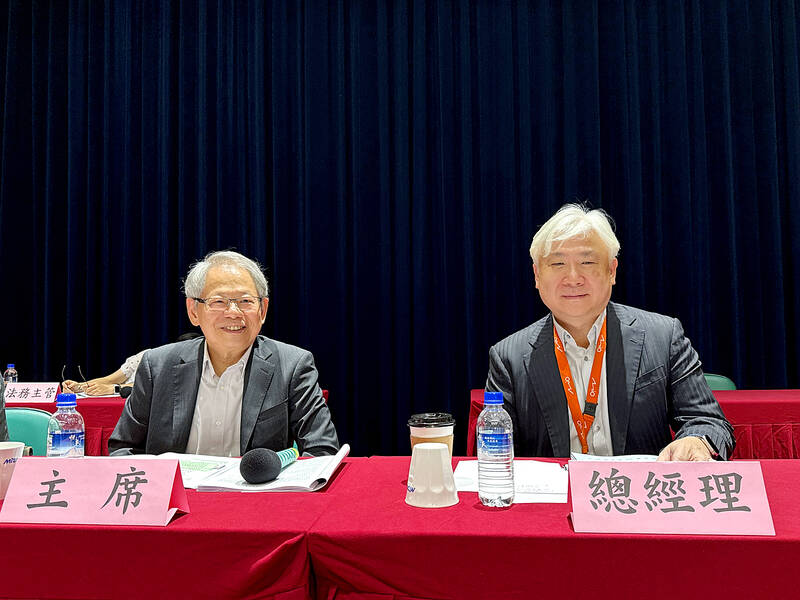MiTAC Digital Technology Corp (MDT, 神達數位), the in-vehicle computer division of MiTAC Holdings Corp (神達電腦), yesterday said that its revenue in the second half of this year would exceed the first half after securing major supply contracts.
The company said it is cautiously optimistic about its business outlook for this year, reiterating its goal of achieving double-digit year-on-year revenue growth, after it secured a large order from an European vehicle fleet management system provider, MDT president Arthur Chang (張樂群 told reporters after the company’s annual shareholders’ meeting.
Under the terms of the contract, the customer would rent in-vehicle telematics equipment from MDT on a monthly billing basis, with an initial term of three years, an MDT official told the Taipei Times by telephone.

Photo: CNA
Shipments would primarily be directed the customer’s subsidiaries in North America, MDT said.
Regarding the potential impact of the 32 percent US “reciprocal” tariff, Chang said that some clients have requested the company consider relocating production to North America, with the company currently assessing the feasibility.
Some customers have opted to front-load their orders, while others have adopted a wait-and-see attitude and postponed shipments, Chang said.
MDT is in discussions with customers about how to share the tariff burden once the 90-day pause concludes, he said.
Regarding the recent sharp appreciation of the New Taiwan dollar against the US dollar, Chang said the company has managed the situation relatively well, but it still poses a challenge to its revenue growth.
The stronger local currency could reduce the company’s revenue when converted into NT dollars, he said.
MDT’s revenue last year increased 41 percent year-on-year to NT$6.98 billion (US$239 million) with 37 percent of that coming from mobility products.
Artificial Intelligence of Things (AIoT) products accounted for 34 percent, while telematics, including in-vehicle computers and related software, made up 20 percent. About 9 percent came from other products.
Net profit for the year increased 39 percent year-on-year to NT$171 million, company data showed. MDT did not propose a cash dividend for the fourth quarter of last year, as the company distributes cash dividends quarterly, unlike most local companies which pay annually.

Sweeping policy changes under US Secretary of Health and Human Services Robert F. Kennedy Jr are having a chilling effect on vaccine makers as anti-vaccine rhetoric has turned into concrete changes in inoculation schedules and recommendations, investors and executives said. The administration of US President Donald Trump has in the past year upended vaccine recommendations, with the country last month ending its longstanding guidance that all children receive inoculations against flu, hepatitis A and other diseases. The unprecedented changes have led to diminished vaccine usage, hurt the investment case for some biotechs, and created a drag that would likely dent revenues and

Global semiconductor stocks advanced yesterday, as comments by Nvidia Corp chief executive officer Jensen Huang (黃仁勳) at Davos, Switzerland, helped reinforce investor enthusiasm for artificial intelligence (AI). Samsung Electronics Co gained as much as 5 percent to an all-time high, helping drive South Korea’s benchmark KOSPI above 5,000 for the first time. That came after the Philadelphia Semiconductor Index rose more than 3 percent to a fresh record on Wednesday, with a boost from Nvidia. The gains came amid broad risk-on trade after US President Donald Trump withdrew his threat of tariffs on some European nations over backing for Greenland. Huang further

Nvidia Corp’s GB300 platform is expected to account for 70 to 80 percent of global artificial intelligence (AI) server rack shipments this year, while adoption of its next-generation Vera Rubin 200 platform is to gradually gain momentum after the third quarter of the year, TrendForce Corp (集邦科技) said. Servers based on Nvidia’s GB300 chips entered mass production last quarter and they are expected to become the mainstay models for Taiwanese server manufacturers this year, Trendforce analyst Frank Kung (龔明德) said in an interview. This year is expected to be a breakout year for AI servers based on a variety of chips, as

HSBC Bank Taiwan Ltd (匯豐台灣商銀) and the Taiwan High Prosecutors Office recently signed a memorandum of understanding (MOU) to enhance cooperation on the suspicious transaction analysis mechanism. This landmark agreement makes HSBC the first foreign bank in Taiwan to establish such a partnership with the High Prosecutors Office, underscoring its commitment to active anti-fraud initiatives, financial inclusion, and the “Treating Customers Fairly” principle. Through this deep public-private collaboration, both parties aim to co-create a secure financial ecosystem via early warning detection and precise fraud prevention technologies. At the signing ceremony, HSBC Taiwan CEO and head of banking Adam Chen (陳志堅)